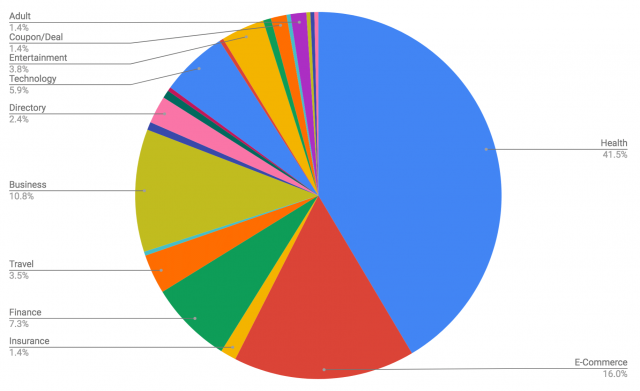What is Google Medic?
In early August 2018 Google surprised many by launching a ‘broad core algorithm update’ that many are calling ‘Google Medic’. This is not its official name but the nickname comes from the fact that the update seems to have had a particularly strong impact on websites in the medical industry. Barry Schwartz the Executive Editor of Search Engine Roundtable did the leg-work for a lot of us summarizing:
“I reviewed over 300 sites, sites that said they were impacted by this update. The first bit of data that sorely stood out around this was that a huge percentage of the sites impacted were specifically in the medical, health, fitness, healthy lifestyle space. In fact, over 42% of the sites submitted were. Here is a pie chart showing how I personally categorized all of these sites:
What are the repercussions?
While a few ‘won’ through the update, many ‘lost’ – big league. Here are some quotes from SEOs at Black Hat World and WebmasterWorld to illustrate the point:
Yes, Seen in last 3-4 hours, 20-30% decline in traffic.
Yes, my main site has lost pretty much all page 1 rankings, game over.
Huge drop in ranking in the past 24 hours, wow! Its not a speed issue, site loads on average less than 3 seconds. Is anyone else noticing a drop in ranking? Biggest drop I had for more than a year.
My site’s traffic is down from 50k to 35k in last 24 hours with majors changes across all positions. Frop #1 to god knows where.
My last site (controlled by seo company, not me) was killed post march update, went from generating 80k revenue per month to peanuts. After this non sense drop in last 24 hours, I am done.
Most of M.Ad’s websites were saved from the slaughter but one of our hardest hit accounts dropped from position 8 to position 80 for a target keyword in the organic search results.
Google Medic and Intent
Naturally, SEO’s everywhere are scrambling to understand the update and more importantly how they can adapt their optimization strategies to the new broad core algorithm update. Google SearchLiason is probably everyone’s best source of information as the tweets are coming direct from Google. They haven’t said much about how to respond to the update but the tweets below at least acknowledge that something has changed.
No SEO on the planet is going to accept Google’s “no fix” response above. Naturally, online forums have been buzzing with different theories about how best to adapt to the algorithm update. One of the most interesting theories from Yoast is that the update shows results that “best match the intent of the search”. Yoast explains:
“Google has teams of search quality raters that look at sites manually and score them according to a manual. This manual recently got an update, and one of the most interesting changes in that update was a new section about the “beneficial purpose” of a page:
Google has also added the concept of “beneficial purpose” to the Quality Rater Guidelines, where raters are not just asked to rate the quality of the content, but also consider whether the page has a beneficial purpose or use to being on the site. What would a visitor to the site gain?
Why the Heavy Impact on the Medical Industry?
While the concept of “beneficial purpose” is interesting and it makes sense that Google would want to do everything they can to match the searchers intent with the best search results possible, we have yet to hear why the execution of these objectives hit the ‘medical’ industry so severely. M.Ad has a theory that there may be a “protective” undercurrent to this update that looks to match search queries that qualify as medically-focused with the most direct, straight-forward resources out there. Traditional SEO tactics when applied to the medical field could in-theory have lead searchers to resources that were not the most directly applicable to their query. Perhaps Google felt this phenomenon was taking advantage of vulnerable searchers who deserve to be connected to ‘help’ for their medical search inquires as quickly as possible.
A practical process for implementing “Google Medic-Friendly” Content:
- Use Google’s Search Console to examine the specific search queries that are bringing traffic through to your website.
- Examine the pages those search queries are driving traffic to.
- Ask yourself, does your website offer content that would benefit a searcher entering that search query?
- If yes, then match the “purpose” of a page to the “purpose” of a searchers intent. If no, then perhaps it’s better to move onto a search query that’s more relevant to your website.
- Be sure to match the ‘entire’ search query. For example, if the search query is “is ketamine treatment ok for bipolar?”. Don’t expect a page that generally discusses “treatments for bipolar” to rank well. All of your SEO technicals should reflect the full and complete keyword.




